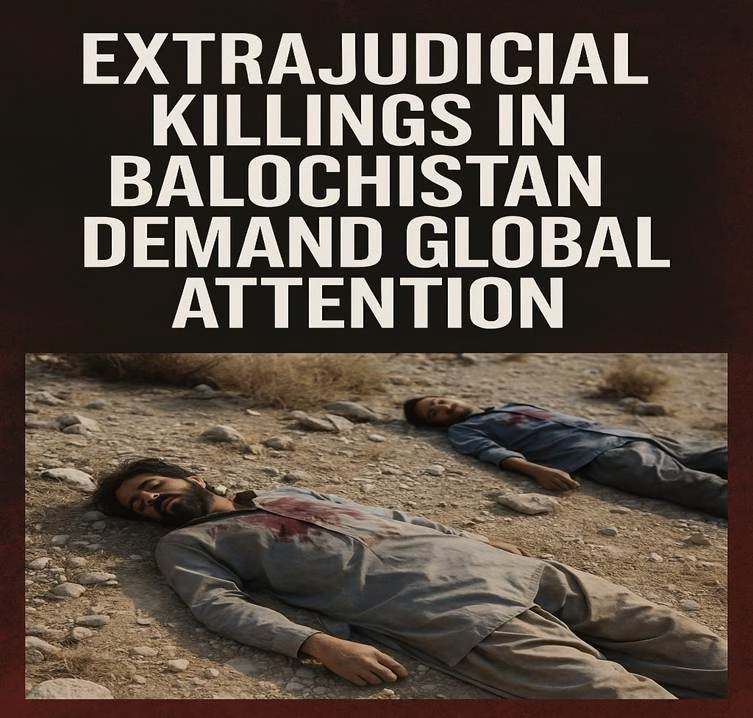
In its 2025 report titled “Pakistan must end crackdown on Baloch human rights defenders,” Amnesty International has issued a scathing indictment of the Pakistani state’s ongoing repression in Balochistan. The report documents systematic violations against activists, students, and peaceful protesters—many of whom are engaged in defending the rights of Baloch people in one of the country’s most marginalized and militarized regions. It paints a chilling picture: a state apparatus that not only criminalizes dissent but also erases those who dare to speak.
A Campaign Against Peaceful Dissent
According to Amnesty, from January 2024 to March 2025, dozens of Baloch activists were arrested, detained without charge, or forcibly disappeared. Their crime? Peaceful protest and advocacy for human rights. Demonstrations calling for the recovery of missing persons, justice for victims of extrajudicial killings, and greater autonomy for Balochistan have been repeatedly met with police violence and arbitrary arrests.
What is particularly alarming is the use of counter-terrorism laws against peaceful demonstrators, a strategy that weaponizes legal frameworks meant for combatting violent extremism against non-violent citizens exercising their constitutional rights. This practice reflects not just overreach, but a deliberate attempt to suppress political expression.
Women and Students: New Frontlines of Resistance
The report highlights a disturbing trend: increased targeting of Baloch women and student activists. In a powerful shift from the past, Baloch women have become prominent voices in protests, often leading calls for justice outside government offices and police stations. In response, authorities have resorted to violent crackdowns.
For instance, a women-led demonstration in Karachi—organized to demand information about forcibly disappeared family members—was met with baton charges and detentions. Several women were arrested without warrants, an act Amnesty described as both unlawful and emblematic of state insecurity in the face of peaceful resistance.
Student activists, especially those affiliated with the Baloch Students Organization (BSO), have also come under siege. Surveillance, harassment, campus bans, and disappearances have created a climate of fear that stifles academic freedom and free thought.
Enforced Disappearances: A State-Orchestrated Tragedy
Perhaps the most harrowing dimension of the crackdown is the widespread use of enforced disappearances, a tactic that has plagued Balochistan for decades but shows no signs of abating. The report cites multiple cases where individuals were abducted by security forces or intelligence agencies—only to vanish without trace.
These disappearances are not random acts of lawlessness; they are deliberate, coordinated acts of intimidation designed to paralyze communities and delegitimize dissent. Families of the disappeared often face their own ordeal—months of uncertainty, legal battles, and threats—only to encounter silence from state authorities.
Amnesty points out that these practices are not only morally indefensible but also violate Pakistan’s obligations under international human rights law, particularly the International Covenant on Civil and Political Rights (ICCPR), to which it is a party.
Suppression of Media and Transparency
Adding to the opacity is tight control over the press and civil society access to Balochistan. Independent journalists, lawyers, and human rights monitors face restricted access, surveillance, and intimidation, making it nearly impossible for the international community to verify claims or support local activists.
The result is a near-total blackout—a region where human rights violations persist unreported and unpunished, shielded by a wall of silence constructed by the state.
A Call for Global Accountability
In its report, Amnesty International does more than document abuses—it calls on the international community to break its silence. It urges global human rights institutions, including the United Nations Human Rights Council and the European Union, to exert diplomatic pressure on Pakistan to end its campaign of repression.
Among Amnesty’s key recommendations to the Pakistani government are:
- Immediate and unconditional release of all arbitrarily detained Baloch activists
- Independent and transparent investigations into cases of enforced disappearances
- Protection of peaceful protest, academic freedom, and freedom of expression
- Legal reforms to end the misuse of counter-terrorism laws against civilians
The Price of Silence
The cost of silence is steep. By criminalizing human rights work and treating dissent as treason, Pakistan is undermining its own democratic foundations. The brutal treatment of Baloch activists not only betrays the promise of federalism and pluralism—it fuels further alienation and instability in an already volatile region.
This is not merely a Baloch issue; it is a Pakistani issue, a human issue. Until the right to speak, organize, and demand justice is safeguarded for all—regardless of ethnicity or region—the vision of a democratic Pakistan will remain incomplete.
Author’s Note:
This article is based on Amnesty International’s 2025 report, document ID ASA33/9434/2025/en. It aims to amplify the voices of those who continue to resist despite fear, and to remind the global community that their silence could be complicit.
Subscribe to Our Newsletter
Get the latest CounterCurrents updates delivered straight to your inbox.
Ashish Singh has finished his Ph.D. coursework in political science from the NRU-HSE, Moscow, Russia. He has previously studied at Oslo Metropolitan University, Norway; and TISS, Mumbai.














































